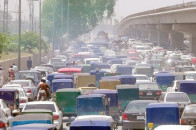Famine in Somalia
In Somalia alone over three million people are in immediate need of life-saving assistance.

The UN has made an urgent appeal for some $2.4 billion that is needed in immediate relief. However, the question is, why has the situation become this bad?
Let’s look at the actors involved.
First, there is the West, led as always by America. This stakeholder seems to be interested in Somalia mostly and that too from the narrow prism of containing extremism in that country and fighting the pirates off its coast. Agreed that it had a bad experience in the 1990s with the country, but since then, Washington has not shown the slightest bit of interest in establishing a representative government in the country. As for the country itself, it seems ungovernable. Furthermore, the militant Islamist group al Shabab, which controls large parts of Somalia and is linked to al Qaeda, is also hindering crucial humanitarian programmes. Somalia’s Transitional Federal Government (TFG), although backed by the west, is weak and incompetent and lacks the ability and resources to tackle the situation. Last but not least, population growth is also a crucial factor.
The way out is simple: if all stakeholders come forward and set aside the politics of oil or the lure of fighting extremism, and focus on the humanitarian issue at hand, perhaps the situation can be salvaged, or at least the lives of those at risk can be secured.
Sajid Hussain
Published in The Express Tribune, August 7th, 2011.



















COMMENTS
Comments are moderated and generally will be posted if they are on-topic and not abusive.
For more information, please see our Comments FAQ